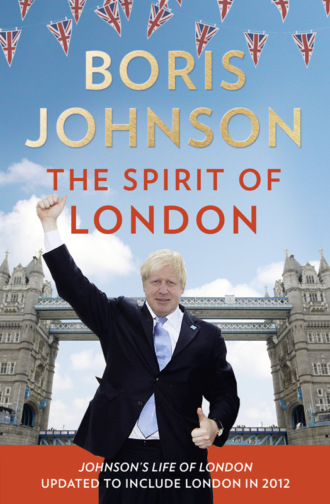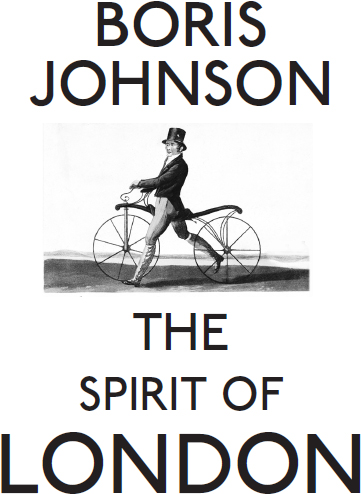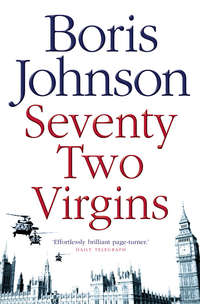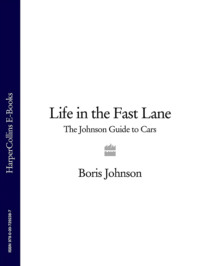
Полная версия
The Spirit of London



Dedication
For Marina
Contents
Title Page
Dedication
Prologue: An Unexpected Triumph
London Bridge
Boudica
Hadrian
Mellitus
Alfred the Great
William the Conqueror
Geoffrey Chaucer
Richard Whittington
William Shakespeare
Robert Hooke
Samuel Johnson
John Wilkes
JMW Turner
Lionel Rothschild
Florence Nightingale and Mary Seacole
WT Stead
Winston Churchill
Keith Richards
The Midland Grand Hotel
Epilogue: Mo Farah
Acknowledgements
About the Author
Also by Boris Johnson
Copyright
About the Publisher
Sundry interesting London inventions have been interspersed in the text
PROLOGUE
An Unexpected Triumph
We all have moments when we think we have really blown it, when we realise we have committed – or are in the process of committing – a goof that is irretrievable and from which there can be no realistic hope of return.
Such were my feelings, round about 9.30 pm, on Friday 27 July 2012.
It was the night of the Olympic Opening Ceremony. I was sitting in the special politburo seats in the stadium at Stratford, with Marina on my left and the Duchess of Cornwall (aka Camilla) on my right. Not far down the line was Her Majesty the Queen, the Duke of Edinburgh, the Prince of Wales, the PM, Sam Cam, International Olympic Committee President Jacques Rogge and the Countess Rogge, Lord Coe, Lady Coe, Michelle Obama, Mr and Mrs Mitt Romney and about 134 heads of state and government from democracies and tyrannies around the world.
We were all acutely conscious that there were about a billion people watching London, and it was a matter of national honour that we should not be seen scratching or picking our noses or behaving in any other unseemly fashion.
I was so overwrought that I will not deny that I had refreshed myself freely at the excellent VIP bar. But I can assure you, gentle reader, that this was nothing to do with the problem that overwhelmed me.
I was engaged in animated conversation with Camilla, who is every bit as wonderful as her most passionate advocates will tell you. She works blindingly hard, and has helped us a great deal in London to publicise campaigns against rape and domestic violence. She was enjoying the spectacle, and I kept leaning forward, toady-like, to make some point or other – to identify the flag of some nation, or to explain why the proceedings seemed to be partly in French. As I shifted my weight (over 16 and a half stone) I felt a little give in the seat beneath. It had been hitherto a comfortable perch, made of padded white leatherette, as swish as the rest of the Olympic stadium. But as I leaned a bit further forward, the underpinnings seemed to wheeze and bend with strain and then …
CRACK
… something serious snapped beneath my right buttock and after seven years of preparation for the Games, after all the speeches I had given about how ready we were, after all the trouble we had taken, as a country, to look competent and efficient I discovered in a millisecond of horror that I had bust my chair and that I was being pitched forward like a sack of coal or a keg of beer or a greased piglet on a tin tray.
And my head was going straight for Camilla’s lap.
As I dived unstoppably for the concrete floor, I reflected on the disgrace. I would have to say that I was drunk. It was the only excuse.
I couldn’t possibly blame the workmanship of the Olympic Delivery Authority, not after we had spent the thick end of half a billion pounds on building this stadium. I thought about the headlines, the savagery of the Olympo-sceptic press. I thought of the TV footage, the absurd sight of the Mayor of the Host City suddenly slipping forward and out of view, like a soldier shot out of line in a Napoleonic battle.
With effort I avoided collision with the knees of the Duchess and grovelled on all fours in front of her like some wheezing retriever; and I thought, as I prepared to haul myself back up, before global derision, that it wasn’t the first disaster of the evening.
It can now be revealed that a large chunk of the VIP party almost missed the ceremony altogether. For some reason it was decided that we should all take a bus from St James’s Palace through the rush hour traffic to East London, and we set off in plenty of time. There was the Archbishop of Canterbury, and the Leader of Her Majesty’s Opposition and Mrs Miliband, the Commissioner of the Metropolitan Police and various bemedalled heads of the Army, Navy and Air Force, as well as other important ministers and spokespersons. You could have founded a perfectly viable country with that cast list. We had the great Sir Keith Mills, the unsung hero of the Olympics and the man who had done so much to secure the Games for London, we had all sorts of Olympics honchos who had offered up the best part of a decade to preparing for this moment, and we had an excellent driver. But no one had explained to him, with sufficient clarity, about where to exit from the A12, and indeed it turned out, as the evening wore on, that no one was able to explain. We got lost.
We noticed that we were passing the same anti-capitalist protest for the second time. We could see the mystic meccano of the ArcelorMittal Orbit getting closer then edging tantalisingly away. We appeared to be going round and round East London in ever-widening circles and it became increasingly clear that neither Sir Keith nor the driver nor anyone on board had a detailed plan as to how we should penetrate the Olympic Park, and a sort of panicky hilarity took hold of me – an unreal sense that this was beyond anything dreamed up by Armando Iannucci or the satirical scriptwriters of the sitcom Twenty Twelve.
It would be fair to say that when we finally got there – arriving, in breach of protocol, after assorted members of the Royal Family – my nerves were pretty shot; and so as I crouched at the feet of the Duchess I could feel that sense of hysterical absurdity rising again. I hauled myself back on to the listing seat, stiffening my haunches into a kind of squat, to avoid putting too much weight on the busticated mechanism. I looked around. No one, of course, had noticed.
They didn’t hear the crack. They didn’t register my disappearance. They were overwhelmed with the colour and noise of Danny Boyle’s pageant.
Shortly after the Opening Ceremony was over, a Tory MP tweeted words to the effect that it was a load of lefty cobblers; and though he was duly monstered by all and sundry, you could see why certain sensibilities might have been provoked.
If you were a hardline believer in private medicine, for instance, there was an awful lot about the NHS, and it was never quite clear to me why Mary Poppins was at war with Voldemort. From the beginning Danny Boyle had to contend with a certain amount of political scepticism about his entire concept. He was urged to inject a bit more jingo, a bit more of the Trooping of the Colour, a bit more Kings and Queens. Someone (it might have been me) even suggested that he should stage a Cecil B DeMille mime show of all the great British military victories over the majority of the countries we had invited to London – Agincourt, the Armada, Blenheim, Balaclava, Rorke’s Drift, the Burning of Washington, you name it.
All I can say is that thank the Lord (Lord Coe, in this case) that Danny Boyle was left alone to do exactly what he wanted.
I don’t cry much – no more than the next man – but after about five minutes of his epic I was crying like a baby. It began with the rural idyll – the hedgerows and cornstooks and chaps in smocks playing some prelapsarian version of football, the livestock (real beasts) browsing contentedly in the shade of Glastonbury Tor. Then there were those gigantic black chimneys thrusting up through the innocent earth, like some filmic special effect (how did they do it?), and England had been turned into an industrial Mordor for the forging of the Rings. By the end, frankly, you were so zonked with the music and the drama that falling off your chair seemed only polite.
Children who watched that ceremony will remember for the rest of their lives the story it told, simple but essentially right: the rise of Britain, from an agricultural society, via an industrial revolution, to the post-industrial era of telecoms and the internet. At every stage they were informed about the contribution of British writers, musicians, scientists, poets. The show was both welcoming, in that it told the story of immigration; and it was universal, in that the narrative is also, really, the story of human beings over the last 1,000 years. It was also terrifically patriotic. So I say to all the Bufton Tuftons who huffed and puffed about leftiness, come off it, folks.
We had Winston Churchill, the Red Arrows, James Bond, the Queen jumping out of a helicopter, and it all began with the Eton Boating Song. You can’t get more misty-eyed and cummerbunded than that.
No, we didn’t spend the equivalent of our defence budget on the closing fireworks (as they seemed to have done in Beijing in 2008), but I don’t think we short-changed the world by so much as a single squib. It was an epic display of ordnance; and it was with shell-shocked expressions that we all spilled out afterwards into the VIP lounge – while the indefatigable Paul McCartney was still leading the crowd in the modern equivalent of the Ode to Joy, the la la la climax to ‘Hey Jude’. We congratulated each other reflexively, and though we didn’t say it, we all wondered, ‘What was that, hey? Was that really as good as it seemed to be? Was it?’
The following morning we were asked to show the Queen the view from the top of the ArcelorMittal Orbit, and since I was early I wandered down the path beside the Lea. Ten years ago, this had been a scene of post-industrial devastation, a wilderness of abandoned fridges and the carcases of vehicles, while the stream was a suppurating soup of sewage and battery acid.
Now it was a riparian heaven, with cornflowers and viper’s bugloss and dozens of other English wildflowers, all of them specially cropped in June so that they would bloom at the end of July. This had been prepared not just with care. It was done with love. I was standing there mooching in a poetic way when I became aware of people watching me from the bridge above.
‘Oi, Boris,’ they said, ‘great opening ceremony!’
I did my best to look modest, and as if it were nothing to do with me (which of course it wasn’t, really).
‘Fantastic!’ said other people, and the verdict seemed to be more or less the same as the crowds began to build. After we had finished up the Orbit, we took Lakshmi and Usha Mittal to the world’s largest McDonalds – which was worth it just to see the world’s richest man paying for a McFlurry with a £50 note, and the expression of disbelief on the face of the Indian-origin McDonalds woman who served him.
As we queued I tried to keep an ear out for what people were saying. They seemed to like the Park, with its Legoland atmosphere, the spongy playground surface with its multicoloured blobs. They thought the stadium looked ace, and no one was complaining that the ‘wrap’ – the dazzling white triangular streamers of plastic – had been supplied by Dow Chemicals. They liked the look of the Orbit, and expressed a general desire to go up it. No one had anything but praise for the Opening Ceremony.
I started to dare to hope that it would all be all right after all.
There is a myth now being peddled by some of the previously Olympo-sceptic media that the thing had always been fated to succeed, and that there was never the slightest danger of anything going wrong.
Well, all I can say is that is not how it felt, and that is certainly not what those same journalists were saying for years, months, weeks, days before the Games began. There is a great and famous editor of a much-loved family newspaper who is said to have approached his backbench on the eve of the Opening Ceremony, and addressed them with his usual vaginal endearment. ‘Now look here, you ****s,’ he said, ‘this thing is going to be one disaster after another. That’s how I expect you to cover it. Now I’m going on holiday.’
He spoke for a sizeable minority who hated the idea of the Olympics (and the Paralympics) since even before 2005, when London won the bid.
They hated the expense of the whole thing, and were appalled when Gordon Brown allowed the bill to rise to £9.3 bn. As one of them – an otherwise saintly fellow – put it to me: ‘Why can’t we spend the money on something useful, like nuclear missiles?’
Some of them may have disliked the fact that the decision by the IOC to award the Games to London was a considerable achievement by such Labour figures as Tony Blair, Tessa Jowell and Ken Livingstone. They couldn’t bear the thought of the city prostrating itself before the supranational sporting bureaucrats. They raved about the insult of consecrating Zil lanes in the congested streets, from which tint-windowed Olympic limousines would spray the trudging populace with sludge.
No detail was too small for their scorn. They didn’t like Locog’s jazzy geometric 2012 logo – and some conspiracy theorists claimed that it read ZION rather than 2012. They didn’t like the magenta uniforms of the volunteers, the Gamesmakers and the Team London Ambassadors.
They sneered at their trilby hats.
They winced at the unveiling of the 2012 mascots Wenlock and Mandeville, and claimed that their cyclopean visages would give the kids nightmares. Even in east London, the target of the taxpayers’ plenty, there were action groups who said that the ‘improvements’ would only pasteurise and homogenise the landscape, and who accused Locog of behaving with the insensitivity of an occupying power. It was alleged that the Pentagon was stationing Predator drones on the rooftops, and a group called ‘South London Against Missiles’ evoked the spirit of the Greenham Common women.
As the day drew nearer, the mood of the coverage darkened. In April, AA Gill informed readers of The New York Times that the whole of British society was poised to reject this alien transplant. ‘We have collectively, osmotically decided that we hate the Olympics,’ he said, while Der Spiegel’s London correspondent prophesied that the city was heading for ‘an Olympic-sized disaster. London and the Olympics are clearly not made for each other. Visitors will need determination and – most of all – patience just to reach the venues at all. As for the locals, it all can’t end soon enough.’
The trouble with that crushing verdict was that there was a time when it looked just about right. None of us, in that dodgy period, conceded any of these points – not in public. We talked confidently about ‘pre-curtain-up jitters’, and insisted that London was as well if not better prepared than any previous host city. That was true; but it was also true that there were three serious anxieties, at least in my heart. They concerned transport, security, and the weather.
Next year (2013) the London Tube network is 150 years old. It is the oldest underground network in the world, and it is rightly undergoing a vast and costly upgrade. We are putting in new trains, track and signalling while transporting millions of Londoners every day – an undertaking a bit like performing heart surgery while the patient is still playing squash. We have known for years that the upgrade of the Jubilee line – enabling an extra 30 per cent capacity – was crucial for the success of the Games. We needed to install new signalling to move that many people to the Stratford site; and yet the process of changing the system, and the teething problems of the new system, were causing repeated disasters.
Bits would fall off the bottom of the train; the system would short-circuit; the software would fail; and time after time we would end up with hundreds of people walking through the Stygian tunnels to escape. There seemed to be no rhyme or reason to the failures, no way of averting them.
‘Is there any way we can be sure this won’t happen during the Games?’ I remember asking, and I remember too the thrill of apprehension when I realised that the answer, frankly, was no.
Then with days to go until the Olympic ‘family’ started to descend on Heathrow (where we were worried about queues) it emerged that the Highways Agency had doubts about the fitness of the M4 at Boston Manor. Some pipe-puffing engineer had done a last minute inspection of the viaduct – and decided that it was about as robust as a freshly dunked Hobnob. It would have to be closed, they said, until surgery could be carried out.
Closed! The major artery for conveying tens of thousands of athletes, journalists, diplomats and bureaucrats from Heathrow to central London. We had seven years to check the load-bearing capacity of this blinking motorway viaduct, and we had known for seven years that this was a crucial part of the Olympic Route Network – and now they wanted to close it.
Then the buses went on strike, and demanded extra pay for the ‘extra’ duties they would have to carry out during the Games. Then the taxis went on strike, in protest at the so-called Zil Lanes. I had sympathy for the taxi drivers, because there was no doubt their lives would be disrupted by the Games, and we had done our best to help them. But I couldn’t believe they would actually try to paralyze the traffic, during an event of national importance, when the eyes of the world were on London.
I stood in my office looking down on Tower Bridge, and the gridlock that was being created by this funeral cavalcade of crawling black cabs, and I fumed and wished that we lived in some totalitarian state where we could send in the tanks and crush them like bugs. Already there were reports of delays in the West End, and we braced ourselves for complaints from the Olympic hierarchs.
Yes, it really looked as though transport was going to live up to its extensive billing, and prove to be the single biggest risk of London 2012.
Until, that is, we heard about the problem with the G4S security guards. It says much for the general shrewdness of Peter Hendy, the Transport Commissioner, that he spotted this one a long way out. Round about Christmas we were told that Locog had decided to increase the number of G4S guards to about 14,000, and Peter was instantly sceptical. ‘I don’t see how they will recruit that number,’ I remember him saying, ‘not in that time.’ And yet G4S was having none of it. It’ll be fine, they said. We could do it standing on our heads, they said. They even claimed that they could mount another simultaneous Olympics in Australia. So when it was finally revealed – with about three weeks to go – that we weren’t going to have enough staff to run the Personal Search Areas, it is fair to say that we were flabbergasted.
Day after day we would turn up to the Olympic cabinet meetings at Cobra, and hear these incredible figures from the Home Office. They were 3,000, 4,000, 5,000 short. No, they had no idea where they were. They could have joined the Foreign Legion; they could be working on Cornish lobster trawlers or serving as short-order chefs in Acapulco.
No, they had no means of getting in touch with them. No, we didn’t have their mobile phone numbers. The only hope, we were told, was to call on more military personnel.
But there was one thing that worried me more than the Tube, the traffic and the massive no-show by the security guards – and it was the one thing nobody could do a damn thing to avert. It was the rain.
Almost the whole nation had enjoyed the Diamond Jubilee. It was an extraordinary display of loyalty and gratitude to the Queen for sixty years on the throne. The main event was the great river pageant, the largest such regatta for about 300 years, and the overall impression was magnificent – hundreds of boats, of all shapes and sizes, dotted over the Thames like a modern Canaletto. But it is no use pretending that the day was 100 per cent perfect. The event would have been even more spectacular if the weather had stayed fine, and by the end of that cool June day it was very far from fine.
The crowds were still vast on both sides of the river – about a million people, the largest single collection of human beings I have ever seen with my own eyes – but by 5 pm they were getting pretty cold and soggy. When the flotilla reached Tower Bridge the rain was coming down towards us almost at 45 degrees, like biting silver darts. The band played on, and the choirs continued to sing with water running down their noses, but the cloud was so low that the fly-past had to be cancelled and the next day the headline in the Guardian (admittedly not the most fervently monarchist paper) was brutal. ‘It’s a Royal Wash Out’, the liberal-left organ declared, and the next day it was announced that the Duke – who had stood bolt upright, at the age of 90, throughout much of the proceedings – had been taken to hospital for observation.
I thought we could take just about anything on the night of the opening ceremony: a Tube failure, some traffic snarl-up, perhaps even some difficulties getting the VIPs to their seats. What I didn’t think we could shrug off – not easily – was a cold and continuous downpour.
More than four years ago it had been decided to save money and build only a truncated roof for the Olympic stadium. In the event of rain, therefore, about 30 per cent of the audience would stay dry and about 70 per cent would get more or less wet. This seemed a reasonable risk, given that London has less rainfall than Rome and that it is not raining 94 per cent of the time.
Now, however, the prognostications of the Metmen were awful. The BBC was predicting rain, but there were some who said that was too optimistic. Piers Corbyn has gained fame for his ability to outdo Met Office forecasts, apparently by studying solar activity. I became a fan of his work after he correctly foretold the very snowy and cold winter of a few years ago, and I receive his regular emails. They made blood-curdling reading. He was forecasting cataclysmic inundations on the night of July 27th, an absolute downpour complete with thunderstorm …
And lo! Now it was the morning of the first day, and the Opening Ceremony had evidently been a far bigger success than we had expected. The transport had coped, there had been no bomb scare, and above all there had been barely a drop of rain – a fine Scotch mist, perhaps, about an hour before it began, no more.
For the first few days it remained a see-saw between hope and gloom, with some of the media still doing their best to stress the downside. A G4S guard was arrested for a bomb hoax, and there were persistent reports of ticket touting by members of the visiting athletic teams. But the story that threatened most embarrassment was the ‘empty seat scandal’ – a phenomenon seen at every Olympics, where the cameras dwell on seats not occupied by IOC members and other sporting officials, and the general punter – who has tried and failed to buy tickets – is whipped up into a state of understandable wrath.
We managed to solve the ‘empty seat scandal’, mainly by getting armed services personnel to sit in the gaps; and then it was claimed that London had been turned into a ‘ghost town’ and that business was on its knees after our travel warnings – including some perfectly reasonable announcements I made over the Tube, encouraging Londoners to plan their journeys – were said to have scared people away.





